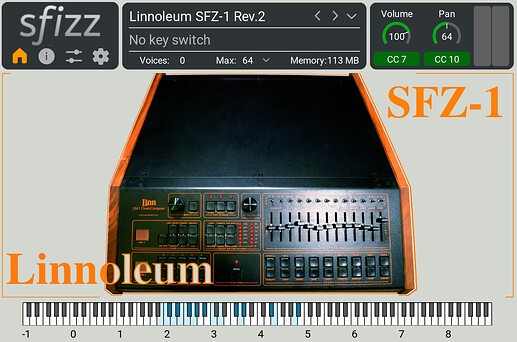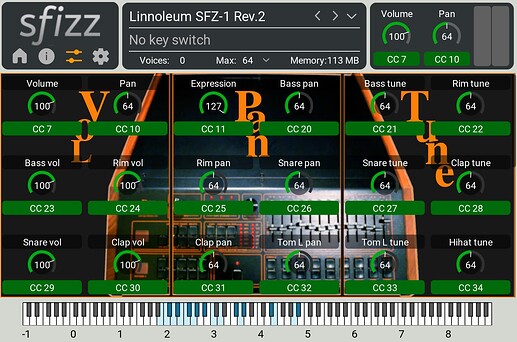Not completely on topic - since it concerns the sf2 format - but this compact, occasionally lovely and very usable orchestral + choral set is both worth mentioning and having in the Zynth soundfont archive. Not sure if parts of it already belong in the stock Z soundfont collection. Anyway, this is the download link:
I love this topic. There is CC2, Aftertouch,… Need to try as soon as possible !
Also a bit off topic, but what I would love is a virtual processor called “Soundfont” or so with a common preset list for sf2 and sfz (and gig or whatever) which loads another soundfont processor depending on the format and a user definable default.
That would certainly be awesome, and, together with the currently boiling soundfont parameters automation system, would make the Zynthian, even more than already is, a formidable rompler station.
Pity that, as of now, there is little development in the area of either free or commercial SF libraries. The whole Pianobook concept is obviously very nice in social spirit, but part of the more interesting content is not in SF formats, and most of it falls honestly in the field of goodwilling weird experiments: not so many actually usable instruments in a real compositional context.
Regards ![]()
I made another thread about that to just not hijacking this one for the purpose.
Otherwise, I totally agree with you. Just some notes:
- There are tons of already freely available sfz. If the sample material is good enough, with a little tweaking they can be improved quite radically.
- Pianobook had more sfz in the past. It stopped after Dave Hillowitz developed the DecentSampler format which is a great attempt in offering a free (as in beer) alternative to Kontakt. But regarding the DecentSampler scripting language I quite don’t understand why he did not maintain a two way compatibility to sfz, since it actually looks like sfz with fancy new xml tags.
- Otherwise: It’s fairly easy to convert DS (and also other) libraries to sfz. Someone who knows better might also want to have a look into this, since sfizz seems to have an import function for DecentSampler instruments. (Maybe it even loads DSPresets and DSLibrary already?)
Here I tend to disagree a little bit. Sure, I did not look too much into these libraries called “bowed oven rack” or “haunted microwave”. But there are many instruments I prefer over some pricy professional libraries because they really sound like a musical instrument which was recorded than an edited to perfection version of it. Though this applies mostly to non-legato instruments of course.
Ok, can somebody please try to load a DS library to sfizz? If that is already possible by default we should really add at least .dspreset format to the supported sfizz formats. Don’t know about .dslibrary and .dsbundle right now.
I just added dspreset extension to sfizz and it simply works. Nice ![]()
Thanks!
![]()
Well, thats a breakthrough.
So zynthian now supports a new rompler file format: Decent Sampler (*.dspreset)
Enjoy!!
Where did you put the files? Right into the sfz subdirectory? Or will there be a decent sampler subdirectory?
Let’s see how good the sfizz importer is. If it is, there are some intruments to try.
Reading this file, there might be a limited set of opcode import functionality, so it would be interesting, how instruments with multiple mic positions or velocity fades work.
Another note: Reading this file sfizz might be even capable of loading single audio files and generate an instrument from it. But it’s questionable if it would offer anything you couldn’t achieve with samplerv1.
Yes, you put the bundles inside SFZ folder (banks)
Ohh! You will find a few ones in github too. Like this one:
It sounds really fine, but you must download the samples separately from another place (explained in the description).
Regards,
Wow!
Gosh, this opens up a whole new area of instrument libraries to draw from. Amazing! Thanks @jofemodo ![]()
![]()
Are you able to test some dspreset libraries? From what I see here, the set of imported opcodes seems to be fairly limited. From what I read it might only support:
<global>
<group>
<region>
volume
amplitude
amp_veltrack
sample
key
lokey
hikey
lovel
hivel
offset
end
transpose
pan
trigger
on_locc
on_hicc
loop_start
loop_end
loop_crossfade
loop_mode: (loop_continuous, no_loop)
ampeg_attack
ampeg_decay
ampeg_sustain
ampeg_release
seq_position
But that might be enough for most basic libraries.
It would support then:
- Basic sample playback including velocity layers
- release/legato triggers
- sample looping
- ADSR
- round robins
What it would not support then is: cc controlled parameters, velocity fade-in/out, voice groups of any kind, keyswitches, filters and so on.
I see your point @hannesmenzel, and there is no denying that the reality itself of freewill samplists committing to produce instruments for everybody to use is a spiritual plus in itself.
This being said, the potential usefulness of a given timbre is rather subjective, depending on compositional habits and musical language. There are certain kinds of sample library fixtures (like strings, brass, woodwinds and choral ensembles) which are objectively hard to record, manipulate and assemble in an essentially homemade context. That is also the reason why in PB interestingly unusual sonic experiments tend to prevail.
That is true, and I really wish I had the time to develop your remarkable knowledge of sfz opcodes. ![]()
Best regards ![]()
Totally valid point.
It just seems like. The improvements I try to do (velocity sensitive filtering, fake random robins, vel crossfades) mostly rely on not more that 10 different opcodes. I’m far from knowing most of the others.
Here is a new one I made:
https://musical-artifacts.com/artifacts/6074
When the Vangelis branch arrives, the controls will be available on Zynthian. By adding a yaml-file the controls can be group by sound.
yeah linnoleum
Hi @Nathanl!
Great work, mat!! Congrats!
I would like to include this SFZ in the zynthian collection, including the YML files.
Would you agree? In such a case, do you have the yml files?
Regards,

